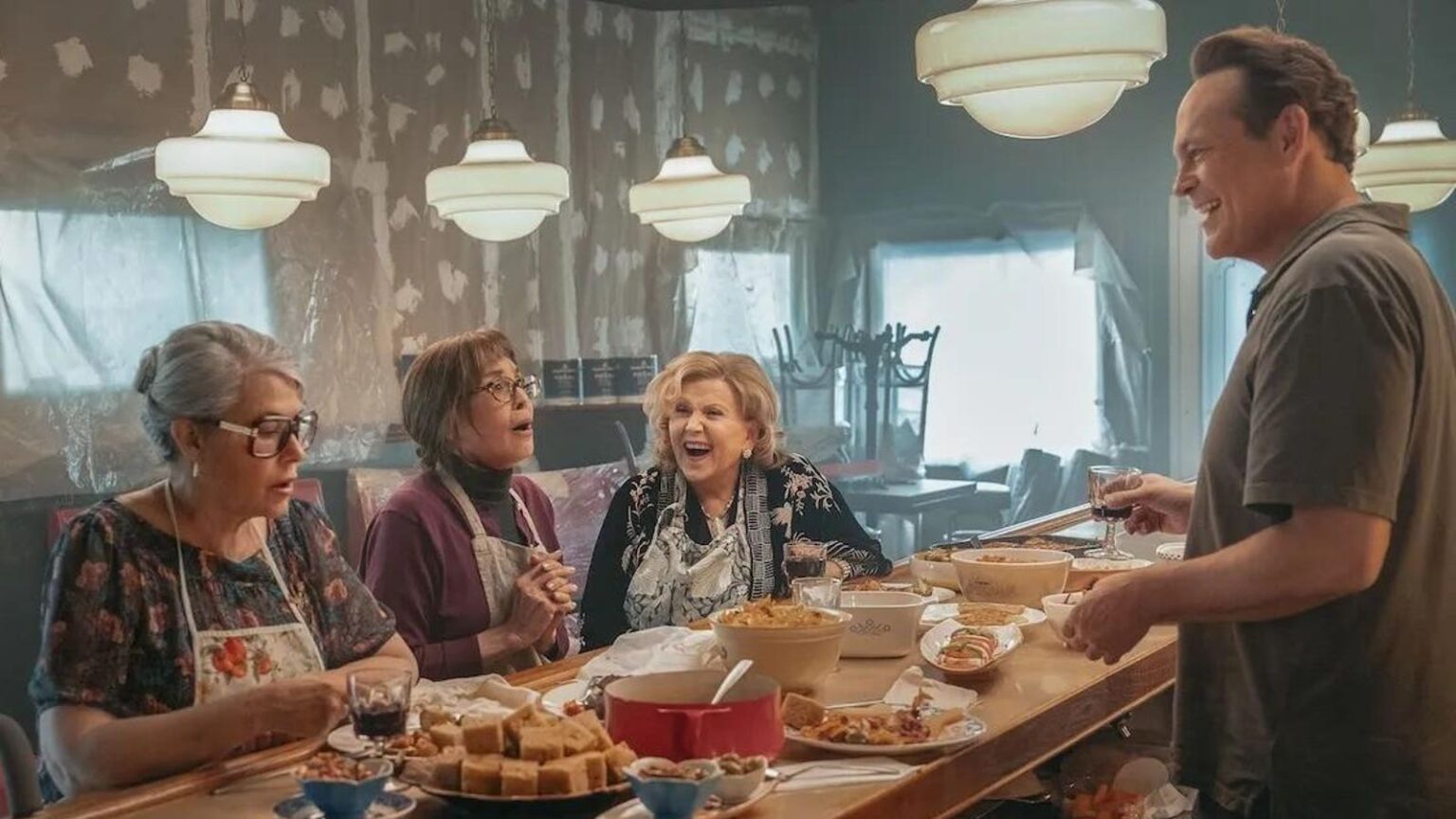Lorraine Bracco, Talia Shire, Brenda Vaccaro and Vince Vaughn star in the 2025 culinary film … More
NetflixNetflix’s latest and greatest movie isn’t an apocalyptic thriller or a celebrity-packed rom-com or a true crime doc—no, today, Netflix served up a warm comfort dish. Nonnas, the new heartfelt food-centric comedy from The Perks of Being a Wallflower director Stephen Chbosky, has quickly become one of Netflix’s best new movies on Rotten Tomatoes. Currently, the Vince Vaughn-fronted film currently owns an 86% approval rating on the service that rounds up critical ratings, meaning it is more than “certified fresh.” The jury is still out on the user score, but the critics have given it a huge thumbs up thus far.
The real-life subject of this family-centered flick is Joe Scaravella, the chef who, after losing both his mother and grandmother, founded Staten Island’s Enoteca Maria in 2007. Nonnas stars Vaughn as Joe, who decided to honor his family’s legacy through food by opening restaurant staffed entirely by Italian grandmothers—aka “nonnas.” These culinary experts came from various regions of Italy, meaning each brought their stories and flavors into this one-of-a-kind kitchen.
The cast of this film is absolutely stacked with legendary actors: Lorraine Bracco (from The Sopranos and Goodfellas) appears as the no-nonsense Sicilian Roberta; Brenda Vaccaro (Midnight Cowboy) portrays the firebrand Antonella; Talia Shire (The Godfather series and Rocky) comes in as the soft-spoken ex-nun Teresa; and the ever-great Susan Sarandon (Thelma & Louise, Bull Durham) plays Gia, the glamorous pastry chef. The supporting cast is rounded out by are Linda Cardellini (Netflix’s Dead to Me, Freaks and Geeks) as Olivia, Joe’s long-lost high school flame and unexpected legal adviser, Joe Manganiello (Magic Mike, True Blood) as his contractor best friend Bruno, and Drea de Matteo (The Sopranos) as Bruno’s outspoken wife, Stella.
What sets Nonnas apart is what has won critics over on Rotten Tomatoes: it’s feel-good nature. While most stories hinge on a story’s “nadir”—the lowest point in the story, the moment where it feels like nothing can be solved—Nonnas appears to thrive on a lackadaisical, free-flowing nature where camaraderie, tradition and culinary passion drive the story and lend the story a relaxed atmosphere. Sherin Nicole from RogerEbert.com calls Nonnas “a Sunday afternoon kind of film,” one that “invites you to sit down, fill a plate, and remember where you come from.” Nicole especially digs the film’s central metaphor about using the art of cooking to “feed your grief,” and praises Vaughn’s quietly tender performance.
Jordan Hoffman from Entertainment Weekly matches Nicole’s enthusiasm. Much like a foodie like me, Hoffman seems to dig classic culinary cinema, from Tampopo to Big Night to Babette’s Feast, and believes Nonnas fits right in with that bunch, specifically praising the cinematography that includes mouthwatering shots of cannoli, zeppole and rainbow cookies. While many may find the film’s “corny” nature off-putting, the review concedes that it manages to eclipse the most annoying of tropes and create its own unique energy, likening its appeal to watching Top Gun: Maverick with your grandmother—predictable, sure, but executed with so much affection you don’t mind being swept away.
But Netflix subscribers should be warned: not every critic is fully sold. While it is still technically a “fresh” review because of its generally positive nature, Associated Press gave Nonnas just two and a half stars out of four, noting that its glossy tone and predictable plot beats hold it back from becoming something more. While praising its earnestness and kindness, the AP critic Lindsey Bahr laments that the film focuses too heavily on Joe’s journey and misses the opportunity to explore the nonnas’ stories in greater depth. “If food is love,” the review says, “give the audience a chance to fall in love with them through their favorite dishes.”
Bahr does admit that the visuals of Staten Island are refreshingly grounded, and that the movie avoids falling into outright gimmickry—which, as it appears according to the majority of Rotten Tomatoes thus far, is what truly marks the charm of Nonnas. It’s not necessarily a timeless classic of the culinary genre, but it does carry a whimsical, positive energy that’s rarely seen in cinema these days. Whether or not it appears on top ten lists at the end of the year, Nonnas does offer up an easy-going experience that offers up both entertainment and true-to-life lessons. For several critics (and I expect many upcoming viewers), it’s already become something more personal: a reminder of family, of rituals passed down through generations, of the power food has to bring us back to the people we’ve lost.
Read the full article here


